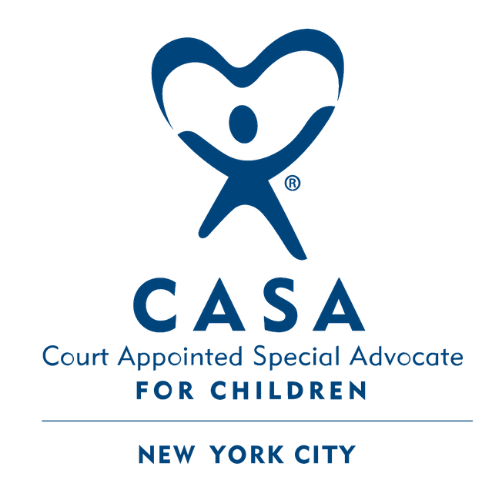Sona Kotecha Shares her Experience as a New CASA-NYC Volunteer
December 7, 2021
In college, Sona Kotecha interned for a public defender’s office. While she didn’t end up pursuing a career in law, the experience stuck with her. So years later in 2019, when she was in between jobs, she decided to look for volunteer work related to the foster care system. A google search quickly led her to CASA, and after pre-service training, she was assigned to two cases, both of which she’s still working on.
Sona’s was appointed to her first case right after being sworn in as a CASA. The case involves Destiny, who was removed from her mother in the hospital after birth. Destiny’s mother, Jada, suffers from a mental illness that may prevent her from being able to independently care for her daughter. Sona was appointed to help facilitate an interstate transfer for Destiny so she could live with Jada’s aunt Rosie in a neighboring state. Sona met the family in the court house just before COVID forced the city’s shut down. “They were all just so sweet, so dedicated and willing to do anything,” Sona says. “Meeting them the first time, it was right before a court case, made me want to work that much harder for this case,“
Ultimately Destiny’s transfer to her Aunt Rosie’s care was not approved by social services. Meanwhile, Jada had been missing her visits with Destiny because she was unable to travel on her own and didn’t have family or close friends in New York who could help her. As a result, the foster care agency determined that Jada’s rights should be terminated and Destiny should be put up for adoption.
Sona, however, knowing how much Jada loved Destiny and that they had a network of family who supported them both, was determined to find a way to keep Destiny with family. She worked with Destiny’s attorney to identify another family member, Jada’s cousin Camilla (the daughter of Aunt Rosie), who was prepared to care for Destiny. Sona helped Camilla file for custody in the family court, and get some small repairs done on her house so she would pass inspection. Finally this summer, Camilla was granted full custody of Destiny, who is now two years old. Camilla lives down the street from her mother Rosie, who helps with child care. The best part is, shortly after receiving custody of Destiny, Sona and Rosie’s family helped Jada move into a new apartment in the same neighborhood as Rosie, Camilla and Destiny. This way, Destiny will be raised surrounded by a loving family, and Jada will have the support she needs to safely maintain her bond with her daughter.
Sona also serves on another case involving a family with four children, the eldest of which needs educational and mental health resources. Joseph is on the autism spectrum and his mom’s ability to help with school work is limited because she doesn’t speak english and has three other children to care for. Like many kids, Joseph struggled with remote learning, so Sona has been helping him access programs that offer more hands-on help. She has also made sure that Joseph and his siblings have weekly therapy sessions and the other services they need.
Communicating with the parents on this case hasn’t always been easy for Sona because the pandemic has limited visits to virtual meetings and they need to speak through a translator. However, Sona says she feels especially connected to the family because she herself is a first generation child of immigrants. Her parents were born in East Africa and moved to the UK before settling in Michigan where she and her brother were born. Her parents always emphasized the importance of education, which she believes enabled her to go to a great college and achieve the life she wanted. But, Sona says, “I also see that my dad was very fortunate to have the immigration experience he had. I often ask myself why I was able to be so fortunate while so many others in a similar situation are struggling…In whatever capacity I can, I would love to be able to help provide this same opportunity to other immigrant families who might be struggling.”
Sona says she began her work with CASA with some important misconceptions about the foster care system. At first, she said she’d thought that parents of children in the foster care system would be somewhat absent but she was quickly proved wrong. “Both of the families that I work with are so, so involved in their children's lives. It's just unfortunately, we have a very complex and bureaucratic system, and then they also lacked a lot of resources to be able to provide stability for their kids,” Sona says.
Now, Sona has come to see her role at CASA as twofold. First, to provide a kind of project management, coordinating between all the different professionals working on a given case and following up when things fall through the cracks. Second, to serve as a support system for families and caregivers who have been directly impacted. “They call me all the time,” she says of the parents in both her cases. “If they just need to vent about something or they just want to feel heard,” Sona says. “It's probably been one of the most emotionally challenging but rewarding experiences I've ever had.”

